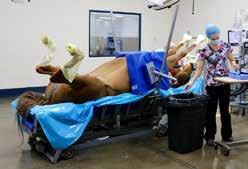
3 minute read
RESPIRATORY
Nasal Spray Controls Severe Equine Asthma
By Adam Marcus A novel form of the corticosteroid ciclesonide appears safe and effective for treating severe equine asthma, according to the results of a large, prospective trial in Europe.
The nasal formulation led to a statistically significant reduction in asthma symptoms over the 10-day study, which included more than 220 animals with severe asthma related to their stable or pastures. A safety analysis found no adverse events attributable to the therapy, which is marketed in the United States as Aservo EquiHaler (Boehringer Ingelheim Animal Health).
The new formulation is a pro-drug of ciclesonide called des-ciclesonide. The medication is administered by a nasal applicator that sprays a low-velocity mist of tiny particles—nearly all of which are 5 µm in diameter or smaller—deep into the animals’ airways. There the particles bind to receptors in the airway epithelium with 12 times the affinity of dexamethasone and 100 times the affinity as conventional ciclesonide.
In the study, 95% of horses tolerated Aservo EquiHaler nasal spray, and 90% of owners complied with treatment.

Lifting Large Animals Since 1957 www.shanksvet.com


Animals in the study received 140 metered doses of the drug over a 10-day period.
“We saw that the ciclesonide-treated group resulted in a 73.4% response rate and the placebo-treated group in a 43.2% response rate,” said R. Scott Pirie, BVM&S, PhD, the chair of equine clinical sciences at the University of Edinburgh, who presented the findings at the 2020 virtual convention of the American Association of Equine Pracitioners (presentation S1001). Moreover, horses that received the nasal spray experienced a much larger drop in a weighted clinical score of 9 asthma-related criteria, including nasal discharge, cough, and bronchial and tracheal noises, as assessed by their owners compared with 3. animals in the placebo group, Pirie said—7.2 points versus 3.8, respectively (P<0.0001).
According to Pirie, 95% of the horses in the study tolerated the nasal spray, and more than 90% of owners complied with the treatment, he added.
Pirie noted that the researchers could not rule out the possibility that some of the horses improved in the study because the allergen load in their environments lessened. However, he added, the owners were instructed not to take any special measures that might have such an effect, or to make the load worse. MeV
There’s nothing else like it.
Over the past 30 years, Adequan® i.m. (polysulfated glycosaminoglycan) has been administered millions of times1 to treat degenerative joint disease, and with good reason. From day one, it’s been the only FDA-Approved equine PSGAG joint treatment available, and the only one proven to.2, 3
Reduce infl ammation Restore synovial joint lubrication Repair joint cartilage Reverse the disease cycle When you start with it early and stay with it as needed, horses may enjoy greater mobility over a lifetime.2, 4, 5 Discover if Adequan is the right choice. Talk to your American Regent Animal Health sales representative or call (800) 458-0163 to order.
BRIEF SUMMARY: Prior to use please consult the product insert, a summary of which follows: CAUTION: Federal law restricts this drug to use by or on the order of a licensed veterinarian. INDICATIONS: Adequan® i.m. is recommended for the intramuscular treatment of non-infectious degenerative and/or traumatic joint dysfunction and associated lameness of the carpal and hock joints in horses. CONTRAINDICATIONS: There are no known contraindications to the use of intramuscular Polysulfated Glycosaminoglycan. WARNINGS: Do not use in horses intended for human consumption. Not for use in humans. Keep this and all medications out of the reach of children. PRECAUTIONS: The safe use of Adequan® i.m. in horses used for breeding purposes, during pregnancy, or in lactating mares has not been evaluated. For customer care, or to obtain product information, visit www.adequan.com. To report an adverse event please contact American Regent, Inc. at (800) 734-9236 or email pv@americanregent.com. Please see Full Prescribing Information at www.adequan.com.
www.adequan.com
1 Data on fi le. 2 Adequan® i.m. Package Insert, Rev 1/19. 3 Burba DJ, Collier MA, DeBault LE, Hanson-Painton O, Thompson HC, Holder CL: In vivo kinetic study on uptake and distribution of intramuscular tritium-labeled polysulfated glycosaminoglycan in equine body fl uid compartments and articular cartilage in an osteochondral defect model. J Equine Vet Sci 1993; 13: 696-703. 4 Kim DY, Taylor HW, Moore RM, Paulsen DB, Cho DY. Articular chondrocyte apoptosis in equine osteoarthritis. The Veterinary Journal 2003; 166: 52-57. 5 McIlwraith CW, Frisbie DD, Kawcak CE, van Weeren PR. Joint Disease in the Horse.St. Louis, MO: Elsevier, 2016; 33-48. All trademarks are the property of American Regent, Inc. © 2020, American Regent, Inc. PP-AI-US-0372 02/2020





